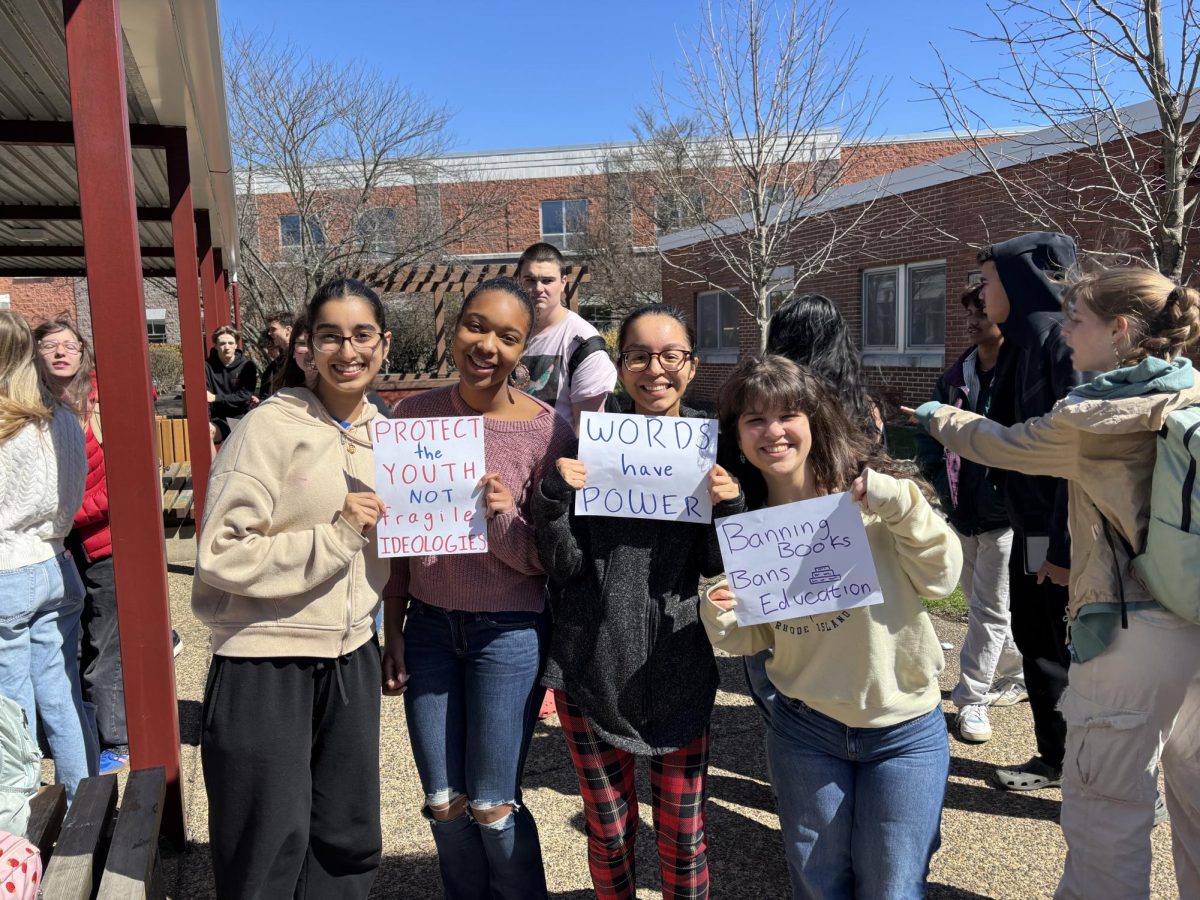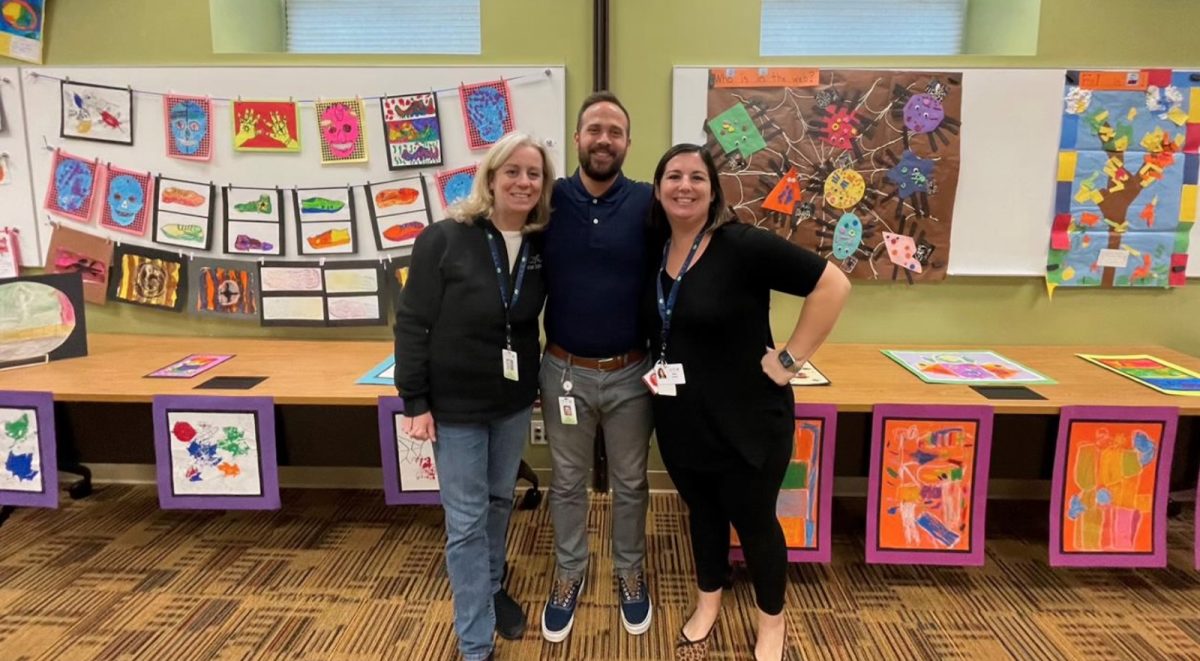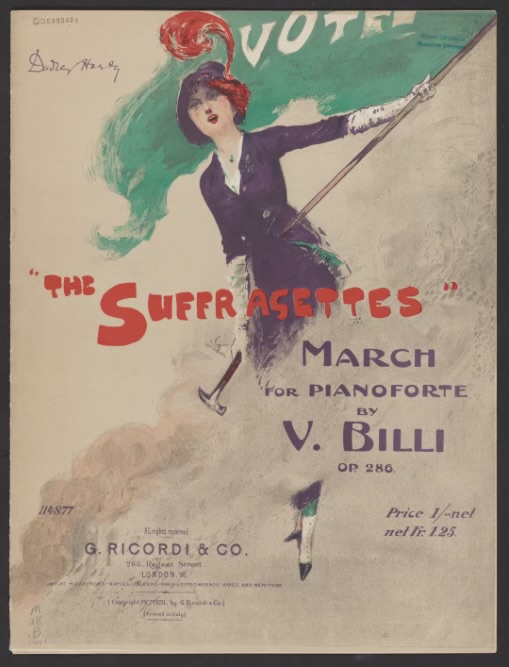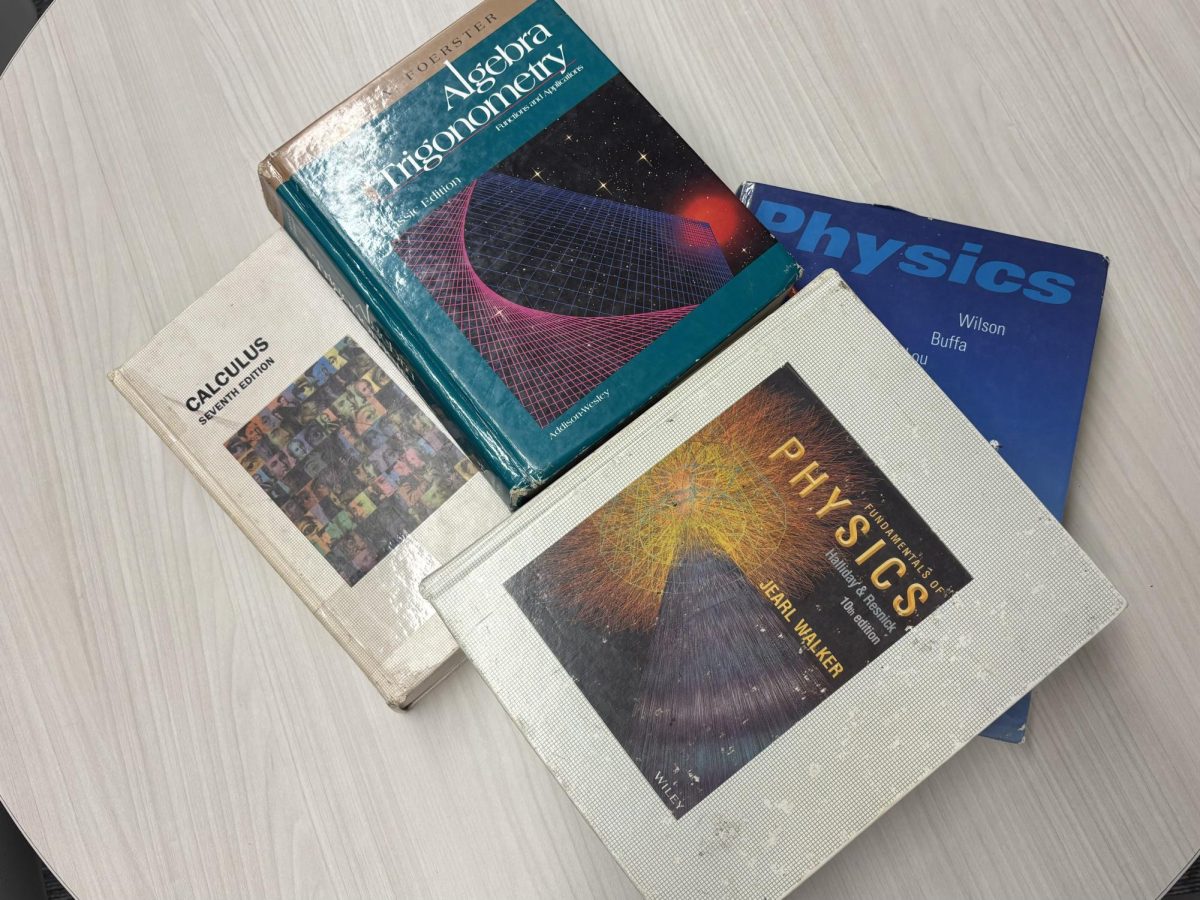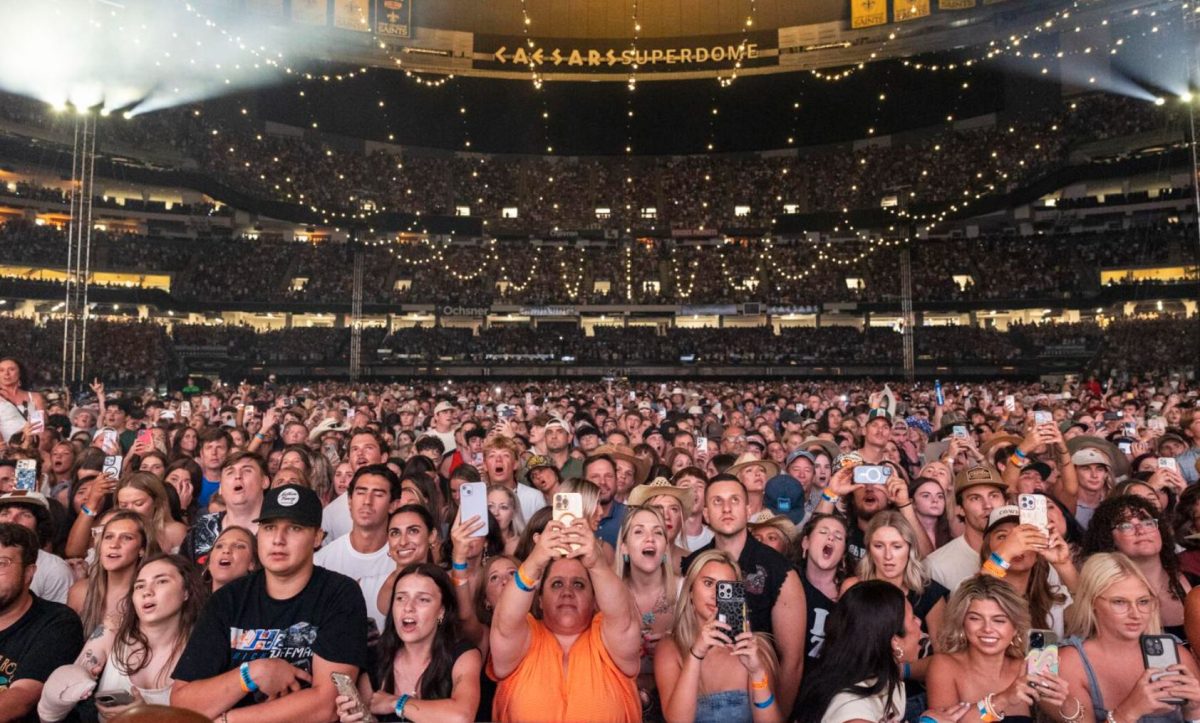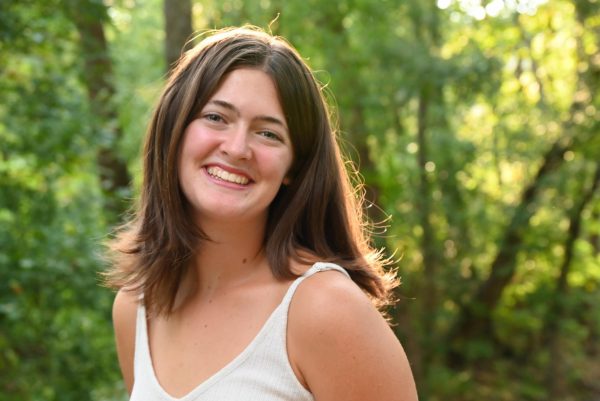Books teach. From The Day the Crayons Quit to The Great Gatsby, books are a part of Radnor’s English curriculum, but students also have access to a wide selection in the school libraries. The elementary schools have picture books and early chapter books selected for younger kids, the middle school shelves middle-grade books, while the high school holds the widest variety of the three. People read in search of understanding— some books explain fact or opinion, but others explore the complexities of human life including morality, meaning, and acceptance. Browse the shelves at Radnor High School to find rom-coms, mysteries, biographies, dramas, graphic novels, and everything in between.
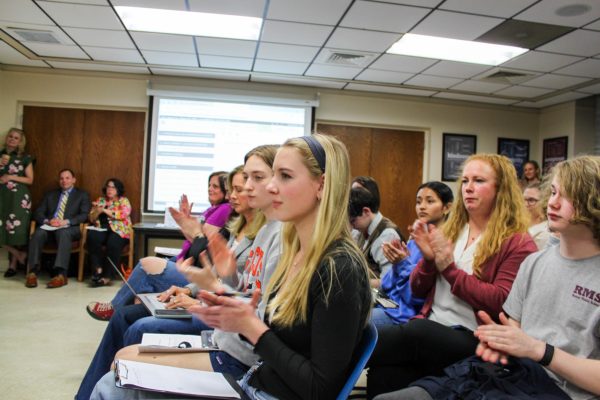
The library is a cornerstone of RHS life. Every week, during the one hour Lunch and Learn period on block days, there’s a line outside of people waiting to get in. During free periods, the library is the first room most people head to. It’s social, because the library is where the people are, but the library is also where new ideas are celebrated. Clubs meet in the quiet rooms, students discuss with librarians, papers after papers are printed, hours of diligent study materials are reviewed one last time. Mrs. Wetzel, one of the librarians, says, “I really try to make it [the library] a place where people could be comfortable and relaxed…” and her work pays off. Kayal Saravanan, a senior at Radnor High School, describes, “My friends and I go to the library every single day, and we use this time as a way to escape the stress and classes.” The comfort of this library is evident to all students as soon as they walk through the doors.
Though just one part of the library, the books at RHS aid the resources available online, provide readings for classes, and allow for copious browsing. The books themselves are often tailored towards the curriculum—Mrs. Wetzel collaborates with teachers to ensure there are enough resources for research and reading assignments, like World Lit’s project on non-US authors. Mrs. Wetzel and the other librarians read “professional journals that are published every month,” in which “professional reviewers” read and review advanced copies of books, and they also “determine what group [the books] are appropriate for.” These journals, like Booklist, which was launched in 1905, and School Library Journal, which was launched in 1954, are credible sources for librarians to know what they’re putting on the shelves. Though librarians make the decisions, parents still have a way to voice their concerns about the materials available in Radnor schools.
The process of challenging a book in Radnor is relatively simple— someone fills out the “Citizen’s Request for Reconsideration of Library Materials,” and an ad-hoc committee is selected by Radnor’s superintendent, as indicated by School Board Policy 144.1. The committee of six consists of an administrator, a principal, a librarian, a Board member, a classroom teacher in the subject area, and a parent, and that group of six then makes the final decision on the book. When selecting members, Dr. Batchelor, the superintendent, looks for, in his words, “fair, balanced people who will be thoughtful about looking at this book,” but the choice is ultimately up to him. The members are legally bound through an NDA (non-disclosure agreement) to keep the meetings confidential and largely to protect those on the small committee from public ridicule. The ad-hoc committee meets and discusses each book before voting on them. There is no limit to the number of books one person can challenge, as long as they fill out the proper form.
On November 15 2021, a Radnor parent challenged Gender Queer, written by Maia Kobabe, for the first time. Gender Queer is a graphic memoir published in 2019. Maia Kababe, who uses e/em/eir pronouns, chronicles eir relationship with gender and sexuality while growing up. The book touches on topics such as pronouns, sex, identity, and self-acceptance, all as Kobabe grows from a kid to adult. The parent challenger objected to the sexual content of the book, warning against possible “harmful psychological effects” from teens reading the book. The ad-hoc committee appointed by Dr. Batchelor met in late 2021, and a final decision was made in May 2022. After the six person committee met, the final vote on the book was split 3-3, so Dr. Batchelor made the final decision. At the time, though he “saw the pictures as being graphic and not appropriate for 14, 15, and 16 year olds,” a large part of his decision stemmed from communication. “I also had no way of reaching out to the student body three years ago and saying that there are concerns about the age appropriateness of this book and the pictures,” rather than “concerns about the genre,” Dr. Batchelor explained to me in early March. In December 2022, a different parent challenged Patricia Polacco’s Mr. Lincoln Way at the elementary school level due to concerns surrounding maturity and the way racism was handled in the picture book. The committee voted to keep the book in school libraries in early 2023. Around this time, people began looking at the policy. Librarians also had concerns with the policy, even before that time, that are in agreement with current district concerns.
On January 17, 2025, a third parent used the policy to challenge three graphic novels: Fun Home, Blankets, and, a repeat from the 2021 challenge, Gender Queer. The parent first voiced concerns about the book directly to Dr. Batchelor, but, in accordance with the policy, completed the challenge in an effort to remove the books. Fun Home is a 2006 graphic memoir that chronicles Alison Bechdel’s late childhood into young adulthood and growing acceptance of her lesbian identity. In the memoir, Bechdel’s older self comments on her childhood with her father in a small, rural, Pennsylvanian town. Bechdel comes into her own sexuality around the same time her father kills himself, which Bechdel hypothesizes was both because of her identity and her father’s hidden gay affairs, some of which with underage boys.
Blankets is a coming-of-age autobiographical graphic novel by Craig Thompson that follows Thompson from childhood to young adulthood. The book explores bullying, faith, religious trauma, and sexuality, as Craig begins to doubt his religious identity and falls in love with a girl he meets at a Christian winter camp. It also has mentions of sexual abuse from when Craig was a child that impact him throughout the rest of the book. The three challenges, which were submitted on the same day, all voice a very similar message. For Gender Queer, the challenger objected to panels depicting sexual activities, focusing on the accusation of “child pornography.” The challenger cited one panel on page 214 of two consenting adults having lesbian sex in Fun Home to request the book’s removal also on the basis of child pornography. In Blankets, he objected to the sexual abuse by an adult and, again, he mentioned child pornography. Child pornography is not something that is published, nor would our librarians even allow it in our libraries. All three challenges assert that these selected panels will enable pedophillia and harm Radnor children. The challenger also neither recommended other materials nor acknowledged anything of value within the book.
The ad-hoc committee as designed by policy 144.1 began meeting soon after the challenges were submitted. The committee had, according to Dr. Batchelor, an “extremely thoughtful, extremely compassionate discussion” about each book before casting their final vote. Each book was voted on separately, after one discussion of all three books, resulting in a final 5-1 vote. Though he wasn’t a voting member of this year’s committee, Dr. Batchelor was present. The committee’s biggest concern and drive for removal was age appropriateness, similar to Dr. Batchelor’s original concerns. Dr. Batchelor cited the “graphic sexual nature of the pictures,” and appropriateness was left up to the discretion of the committee rather than any clear outline. In weighing the cost and benefits of removing the three books from the library, the majority of the committee determined the need to remove the books was higher than the possible positive impact of the books (and negative impact of their removal) on underrepresented students. Around two weeks after the committee voted, the books were removed from the library on Friday, February 28.
The day before, February 27, the book removal was explained to the staff in a staff meeting at RHS. Many Radnor community members’ first time hearing about the book removals was from an Inquirer article on March 4. Shortly after, on March 6, an email was sent to Radnor parents and staff explaining what happened, and for the high school parents, images of the challenge were included. Dr. Batchelor explained the policy in the email and cited both the “weeding/removing library books” clause of the policy and age appropriateness due to “visually explicitly mature content.” Some students and parents believe the books were in large part removed because they had not been checked out, but in our interview, Dr. Batchelor said that the circulation records were “not the driving factors,” they were just “facts that were discussed and shared.” Weeding itself is the planned removal of books, so removal due to a challenge would not be considered weeding, no matter the circulation data. All three books had also been checked out a number of times in the past few years. On March 12, Dr. Batchelor met with student government representatives from the high school. The policy was explained to the student council, and they were given the opportunity to ask questions. The books’ removal has not been shared with all students directly, and most found out through parents or the grapevine.
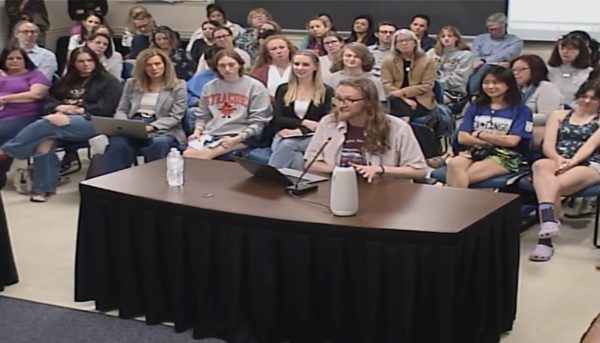
In response, on March 11, at the meeting for the Policy Committee of the RTSD Board of School Directors in the Radnor administration building, some community members gathered to voice their concerns regarding book banning in Radnor through public comment. Parents, students, and other Radnor citizens discussed various topics, including personal anecdotes, representation, and board policy. Owen Elfick, a Radnor community member who works at Main Point Books, spoke about Blankets. During his comment (49:00), Elfick described the story of Blankets, one of a “boy who grows up tormented by a shame of his sexuality.” Elfick said it was “a story [he] needed really badly when [he] was a teenager,” but he never read the story in its entirety due to perceived stigma around the handful of mature panels.
On March 21, a group of students also organized a walkout against the book bans and in support of changing the policy. Students stood in the courtyard, some holding signs, while Rey Whitehead spoke about the negative impacts of book banning and pushed for policy change. Though it was cold and windy, a significant group of students stayed for the 15-minute duration. On March 19, The Pennsylvania School Librarians Association (PSLA) publically stood “behind the professional expertise and sound judgment of the Radnor School District’s librarians” in an email to the Radnor school board, on the basis that our librarians are trained, certified professionals and on a student’s right to read. Community members also organized collective public comment at the March 25 full school board meeting and other following meetings. At the April 8 meeting for the Policy Committee of the RTSD Board of School Directors, the district Solicitor explained that the books could, in response to the outcome of the policy, vote the books back into the library. The Board then voted to return the books to the shelf 6-0 (six voted to return the books and three abstained due to concerns about revising policy first) at the April 22 full board meeting, and they plan to revise the policy in the coming months.
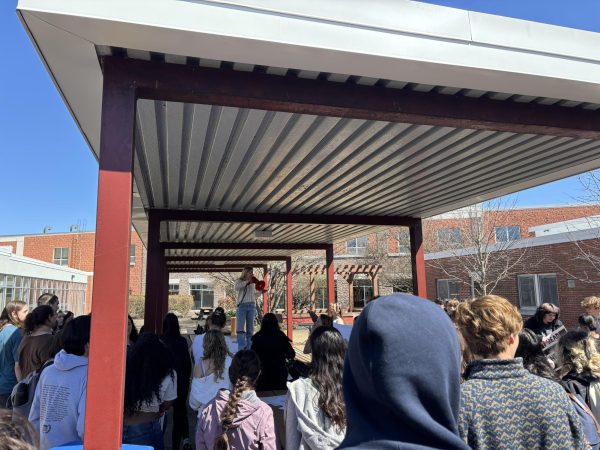
The concerns of community members were largely rooted in the policy. Students and parents have questioned the lack of change in policy. Since 2008, when the policy was created, book challenges have grown, but our policy has not. As Radnor community member Meg Staffeldt included in her public comment at the March 11 meeting of the RTSD Policy Committee, “The number of challenges has grown nationwide from 500 to 4,240 and half of those are” LGBTQ+. The Gossip Girl series was among the most challenged of all books in 2008– “We can’t use the same process we used to discuss Gossip Girl anymore.” Radnor residents have concerns with the lack of appeals process, student inclusion, committee formation, and transparency. The policy, as it stands, does not even call for anyone to be informed of any decision made.
“I believe the first and most important step when reforming the policy should be to make the public aware of challenges on books, and allow others to voice their [thoughts] on how the books have positively or negatively impacted them,” Benji Lo, a current Radnor senior, explained. He and other community members have begun wondering what changes could be made to the policy, after Mrs. Susan Stern, the policy committee chair, at the March 11 meeting of the RTSD Policy Committee informed the audience that the School Board policy committee would discuss and reevaluate the policy with substantial research.
“I wouldn’t have six people. I would not have an even number,” Dr. Batchelor explained of possible changes to the policy. Mrs. Luce, Radnor resident and regional organizer for the organization Red, Wine, and Blue, explained how she looks to other districts’ policies to see what works and what doesn’t. She agrees that there should be more than six members as well, and that a student should be included. “As students, we are the only ones really affected by this ban,” Rey Whitehead, a current junior at RHS, explained. “Not considering the student perspective is a huge oversight that can allow personal biases to get in the way of reality.” Ms. Luce specifically looks towards Oxford Area School District in Chester County’s appeals process as an example. After a book is removed, any “stakeholder and member of the community can file an appeal.” Then, “every member of the school [must] read the materials and review them… and then there has to be a school board meeting with public commentary so that… anybody has the right to their three minutes to make their point heard.” In Radnor, an appeals process could work the same way, with the board being “responsible for the final outcome,” with the exception of our public comments being four minutes, rather than three.
Community members also have concerns over the policy’s process for selecting committee members.The teacher chosen for the committee was a health teacher, rather than an English teacher. In a conversation with the PTO presidents Dr. Batchelor explained that for the 2021 book challenge, “the reason they used a health teacher was that when they look at state standards,” the health department “most closely aligned with the topics and subjects that were in the books,” Mrs. Lee, president of the Wayne Elementary School PTO, recalled. Books with LGBTQ+ characters span genres, so the possible selection of a health teacher due to the ‘LGBT genre’ and subsequent connections to sexual topics of a book dismisses the literary merit of these books. English teachers are well versed in discussing literature—Fun Home is even an optional part of the Viewpoints curriculum—and including English teachers as opposed to other subject areas would likely improve the policy as it stands.
Beyond the procedural issues students, parents, and staff have with the bans, and though the committee reasoning was not content, the book removals still have a toll on underrepresented groups in Radnor. The removal of Fun Home, Blankets, and Gender Queer following Board Policy 144.1 sends a message to marginalized students that their stories are less important, even though that was not their intention. Representation, as described by Rey, is about “giving diverse voices and perspectives a chance to speak, especially those that haven’t had that in the past.”
Since these three books were removed, other challengers may also contest books in a similar way. Following the same policy, these books might be removed by a well-intentioned but non-expert committee. These books will only be books with difficult, but important material. Of books banned in schools during the 2023-24 school year, 44% were about people of color and 39% were LGBTQ+, based on PEN America’s tracking. Challenged books over-represent minority groups, and Radnor’s process, as it stands, threatens proper representation.
Representation in books is not a remedy to bigotry, but it can be incredibly beneficial. When popular media is diverse, people are more likely to find their community and accept others’. Books like Gender Queer, that explain and develop more complex LGBTQ+ issues in an accessible way, can help foster understanding and acceptance of people who may not fall into the traditional gender (or sexuality) binary. Books like Blankets allow for exploration of beliefs and awareness of sexual abuse towards children. Reading literature may also cultivate empathy—for example, a 2014 study proposed that reading Harry Potter from a young age improved empathy towards immigrants, gay people, and refugees because a character driven-story allows the reader to connect to the characters and their plights, which often parallels circumstances of real life.
“Representation in books means equity and validation to various characters,” Addy Carter, a senior at RHS, established. “As a queer African American woman, every time I see someone like me it makes me feel validated as an individual and represented within my larger community.” Listening to student voices is as much respecting them as understanding their opinions. Radnor students deserve a comfortable school environment, and proper representation is a part of that. Tessa Halpern, a senior and the president of SAGA (Radnor’s Straight and Gay Alliance), said, “As I started watching television with queer characters, I discovered so much about myself… In a place like high school where people are finding themselves and growing up, they should have books that are relatable.” For LGBTQ+ students, books with representation can be the difference between personal acceptance and denial.
Book banning has an impact on the Radnor community, even though harm was never the intention. At a time when LGBTQ+ rights are being threatened, especially for trans youth, the gender pay gap increased from 2022-2023, and DEI initiatives are being axed, representation is more important than ever. Books matter, and, as Benji Lo concluded, “It’s important that we protect a child’s right to knowledge and provide them a safe space to learn.”

